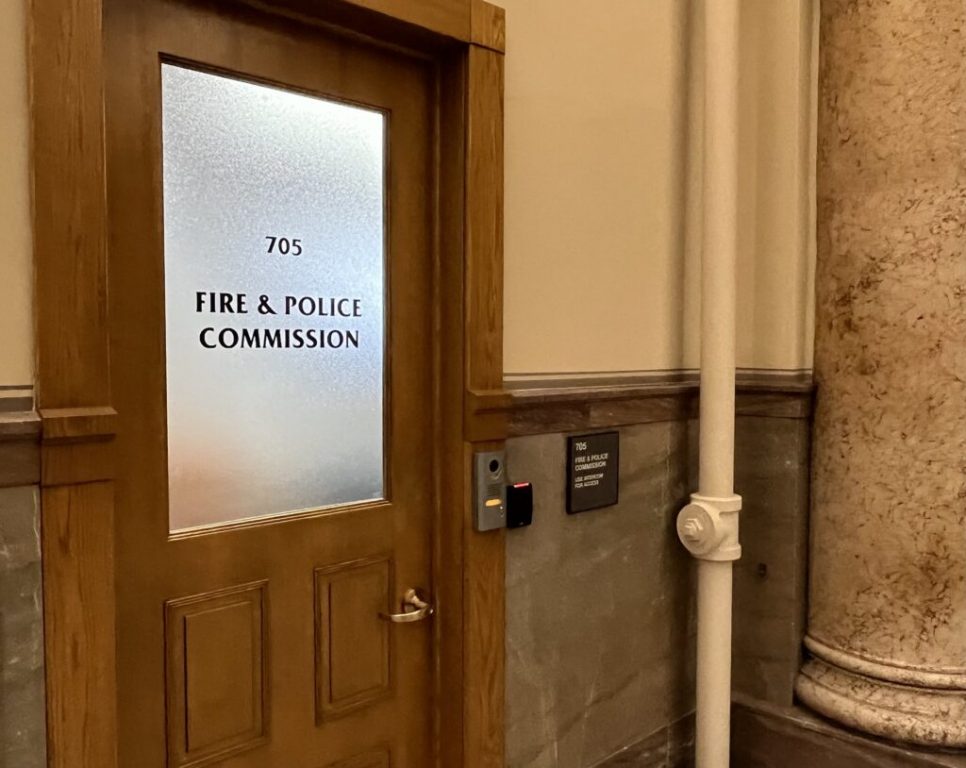Advocates Bemoan Fire & Police Commission’s Loss of Power
It means less power for citizens, less oversight of police, they say.

The office of Milwaukee Fire and Police Commission is housed at Milwaukee City Hall, at 200 E. Wells St. A new law significantly changes the commission’s powers. Photo by Devin Blake/NNS.
Various groups that engage the criminal legal system say Milwaukeeans have lost something special – something that very few cities have: meaningful community oversight of its police department.
Residents now have, these groups argue, far fewer opportunities to have a hand in the way the Milwaukee Police Department operates.
The cause for the change is the 2023 Wisconsin Act 12, which was approved in July. Among other things, the legislation limits the power of the Milwaukee Fire and Police Commission, or FPC, to create, amend or suspend departmental policy – transferring much of this authority to the respective city departments.
Where FPC had the power to “prescribe general policies and standards for the departments,” it can now “advise the Common Council regarding any recommended policy changes,” according to the text of the law.
The final authority on policy now lies with the chief of each department.
Amanda Merkwae, advocacy director of the American Civil Liberties Union of Wisconsin, said that what makes police oversight important is precisely the opposite – that is, independence from these departments.
“It’s critically important,” Merkwae said by email, “to have an independent civilian review board to allow for public input and ensure police accountability. Act 12 flips that on its head and makes the police department far less accountable to the public by removing a primary vehicle for public input on policy changes before they go into effect.”
Alan Chavoya, outreach chair of the Milwaukee Alliance Against Racism & Political Repression, puts the change in even starker terms: “Basically, the number one source of power that the FPC had for any accountability was the policy-making power and that has been stripped away.”
The alliance is a grassroots organization led by Black and Brown residents who are fighting for community control of the police department.
The role of the Common Council regarding police policy also has been significantly changed.
Instead of being able to suspend or modify policies created by the FPC, it can now suspend or modify policies created by the police chief with a two-thirds vote.
In the wake of Act 12, Edward Fallone and Amanda Avalos resigned from their positions on the FPC, chair and vice chair, respectively.
They called the change, an “attack” on Milwaukeeans’ “fundamental right of self-government,” according to their resignation letter.
“Act 12 was a blow to the whole city,” Avalos later told NNS. “It took away something that was a really positive thing that the city had … . It was a really unique form of community power.”
A powerful civilian oversight body
In the United States, a civilian body with this kind of power is unique.
“If you look around the country, at other civilian oversight bodies, they’re much more limited in their authority and so sometimes they just review discipline. Sometimes they just review hiring. Sometimes they have recommendation power, but not final authority power,” Fallone told NNS.
“It was just a handful in the country like that,” he added.
Recent examples of the FPC exercising its power to create policy include a ban on the use of chokeholds as well as a ban on “no knock” search warrants – bans Avalos said she was “really proud” to be a part of.
It was FPC’s exercising of this sort of policy-creating power, especially in the past two years, that engendered backlash, Fallone said.
“That was not an authority that we used very often … . But it’s good to have that potential hard authority in your pocket,” Fallone said.
Police union supports changes
Andrew Wagner, president of the board of the Milwaukee Police Association, MPD’s police union, disagrees.
Wagner said that vesting policy power in the police chief is simply the operationally smart thing to do and will make the police department more effective.
“The changes to the FPC were really put into place to make sure the expert, who is the police chief, is able to manage his department,” Wagner said. “It’s a police chief that has to stay steady and know what’s best for his officers and putting those policies in place with sound judgment.”
“I don’t think a civilian board should have oversight,” he added.
An MPD spokesperson said in an email that it is “working with its intergovernmental partners to determine the best way to move forward with the state law changes. Our department is committed to transparency with the public and establishing practices that keep both our partners and public fully informed of policy changes.”
“To date,” the statement added, “the Milwaukee Police Department has not altered Standard Operating Procedure since Act 12.”
Fallone said that although the FPC lost its “hard power,” it can still exercise “soft power.”
“The FPC still has final authority over all hiring and promotion. It still has final oversight over the disciplinary process. And it obviously can still communicate with the police chief about proposed policy changes,” he said. “It just doesn’t have the authority to approve or disapprove those policies.”
How you can engage
Fallone recommends residents continue to participate in the oversight process by expressing their views at FPC meetings – something which Avalos said she certainly intends to do as a community member moving forward.
The city maintains a calendar where FPC meeting agendas and minutes can be found.
Fallone also said engaging with community outreach officers, within the Office of Community Outreach & Education, or OCOE, can be useful, too.
MPD Sgt. Amy Rivera, who works within OCOE and helps oversee these officers, can be reached at 414-935-7377.
Devin Blake is the criminal justice reporter for the Milwaukee Neighborhood News Service. His position is funded by the Public Welfare Foundation, which plays no role in editorial decisions in the NNS newsroom.
Residents express concerns that changes to Fire and Police Commission will lead to weaker oversight of Milwaukee police was originally published by the Milwaukee Neighborhood News Service.






















This is what happens when we have a weak mayor. Little Chewy Johnson is more concerned with pleasing Republicans than standing up for the people of Milwaukee. Time and again he is down on his knees begging them for scraps from their feast. This commission is nothing but a pile of burned ashes and we can thank the Mayor for that.